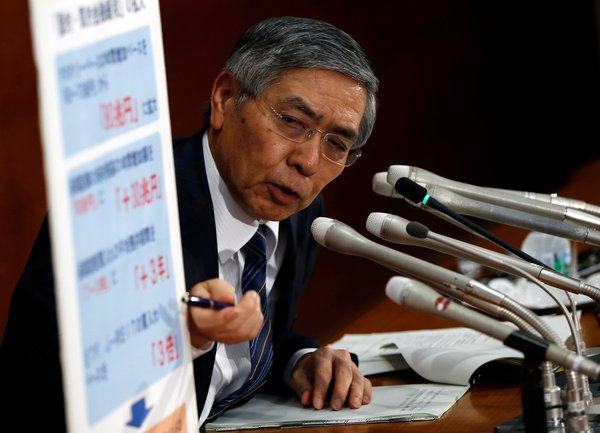(单词翻译:单击)
One central bank giveth, and another taketh away.
一家央行收手了,另一家却要出手。
Two days after the Federal Reserve ended its program of quantitative easing, the Bank of Japan has doubled down on the strategy with a surprise expansion of its program, in which it will now buy 80 trillion yen ($721 billion) worth of Japanese bonds each year with newly created money. If you’re keeping score, the era of central bank money printing is over (for now) in the United States and Britain, very much alive in Japan, and maybe-possibly-on-the-verge of arriving in the eurozone.
在美联储结束其量化宽松计划两天后,日本银行(Bank of Japan)在这一战略上押了更多筹码,出人意料地扩大了量化宽松计划。计划扩大后,日本银行每年将用新发行的货币,购买价值80万亿日元(约合4.4万亿元人民币)的日本债券。留心的人都知道,央行印钞时代在美国和英国已(暂时)结束,但在日本却方兴未艾,而且也许可能即将抵达欧元区。

The Bank of Japan’s new action took markets by surprise and drove a 4.8 percent gain in the Japanese stock market and smaller gains across the globe. It also offers a reminder — or perhaps a warning — of just how hard it will be to get the global economy out of its deflationary funk. And a cycle of bad political decision-making, across many countries, is the reason.
日本银行的这一新举动令市场惊讶不已,推动了日本股市上涨4.8%,并促使全球股市出现了规模略小的上扬。同时,它也给出了一个提醒——亦或是警告——表明让全球经济走出通货紧缩的消沉情绪是多么困难。而原因则是许多国家周而复始的糟糕政治决策。
The back story is this: At the start of 2013, a new government came into power in Japan, led by Shinzo Abe, promising a series of aggressive measures to jolt the Japanese economy out of its long period of stagnant growth and falling prices. A crucial part of that strategy was the appointment of Mr. Abe’s handpicked central bank governor, Haruhiko Kuroda, who promised to do whatever it took to get inflation up to 2 percent in Japan.
背景故事是这样的:2013年伊始,安倍晋三(Shinzo Abe)领导的新一届政府上台,承诺采取一系列大胆措施,促使日本经济走出长期的增长停滞和物价下跌。该战略中至关重要的一步,是任命安倍晋三亲自挑选的央行行长黑田东彦(Haruhiko Kuroda)。黑田东彦承诺将不遗余力地让日本的通货膨胀水平涨至2%。
The initial results were promising. In early 2013 the yen fell on currency markets, and the Japanese stock market rose sharply. For the first time in two decades, there was palpable buzz around Japan’s economic prospects, both inside the country and around the world. “Abenomics” became a household term, at least in households that are interested in international economics.
初期的效果前景喜人。2013年年初,日元在货币市场下跌,日本股市大幅上涨。日本国内和全世界出现了对日本经济前景的明显关注,这是二十年来的首次。“安倍经济学”成了一个家喻户晓的说法,至少在对全球经济感兴趣的家庭里是这样。
But since then, neither the rest of the world, nor the rest of the Japanese government, has done much to help Mr. Kuroda.
但自那时以来,世界其他地方和日本政府内部其他机构,均未采取太多措施帮助黑田东彦。
Within Japan, the fiscal authorities raised a consumption tax this year, aiming to rein in budget deficits in a country with the highest public debt in the world relative to the size of its economy. That created a steep economic contraction in the second quarter, weakness that persisted through the summer.
在日本国内,财政机构今年提高了消费税,旨在控制预算赤字。相对于其经济规模,日本的公共债务是全世界最高的。这导致二季度日本经济严重萎缩,这种疲软一直贯穿今年夏季。
Meanwhile, Europe has dithered as its economy has ground to a halt, and many major emerging economies have slowed. With the rest of the world slowing down and supplies of oil and many other raw materials rising, the price of most major commodities has fallen sharply since the summer.
与此同时,随着经济逐渐停滞,欧洲犹豫了,许多主要新兴经济体也放慢了增速。自今夏以来,在世界其他地方增长放缓,原油和许多其他原材料供应增加的情况下,大部分主要商品价格大幅下跌。
So Mr. Kuroda faced slumping Japanese economic growth because of decisions his own government made and downward pressure on prices due to things that happened in the rest of the world. The credibility of his promise to do whatever it took to get to 2 percent inflation was in doubt.
鉴于日本政府做出的决策,以及世界其他地方发生的事情对价格造成下行压力,黑田东彦面临日本经济增长下滑的问题。黑田东彦的承诺——将竭尽所能达到2%的通货膨胀目标——的可信性遭到质疑。
Hence the surprise move Friday. It was a close call — the vote on the bank's policy committee was 5 to 4, not like the unanimity of Mr. Kuroda’s earlier tenure. But the theater of it may have been helpful in the psychological aspect of persuading people in Japan that their central bank really is serious about getting higher inflation, and that citizens should make their spending and investment decisions accordingly. Inflation expectations tend to be self-fulfilling.
因此日本在周五做出令人震惊的举动。与黑田东彦早前担任行长时获得一致认可不同,该举措在日本央行政策委员会以5比4的投票结果侥幸获得通过。但此事的戏剧性可能有助于在心理上说服日本民众相信,日本央行真的在认真推高通货膨胀率,因此日本民众应该做出消费及投资决定。通胀预期倾向于自我应验。
But while it is nice to see boldness from one of the world’s leading central banks — a sharp contrast with the sluggishness of the European Central Bank in responding to dire threats to the eurozone economy — the move does underscore a broader problem that has haunted the global economy the last several years.
虽然看到世界主要央行之一采取大胆举措是一件令人高兴的事情——与欧洲央行迟缓应对欧元区经济面临的严重威胁形成鲜明对比,但此举的确突显了一个在过去几年中困扰全球经济的广泛问题。
Central banks have been the only players in town trying to boost global growth. In the United States, Congress from 2011 to 2013 ignored the pleas of Ben Bernanke, then the Fed chairman, to avoid sharp spending cuts that would depress growth. Right now, the German government is said to be furious at the E.C.B. president, Mario Draghi, for his calls for more public spending by Germany and other financially strong European nations. And the Bank of Japan is now facing a harder job because of the Japanese parliament’s eagerness to raise consumption taxes.
央行是唯一努力促进全球经济发展的一股力量。从2011年到2013年,美国国会(Congress)忽视了时任美联储主席本·伯南克(Ben Bernanke)的请求——避免会抑制经济增长的大幅开支削减。目前,德国政府据称对欧洲央行行长马里奥·德拉吉(Mario Draghi)感到不满,因为他要求德国及其他财力雄厚的欧洲国家增加公共支出。由于日本议会急于提高消费税,日本央行目前面临一项更加困难的工作。
In each case, the central bank has gotten little support from its government in trying to encourage growth, and carried more of the burden itself, often in the form of yet more quantitative easing, which has tended to sharply boost asset prices in the financial markets but has had much more questionable effects on job creation and wages.
在各个国家中,央行在设法推动经济发展的过程中几乎没有得到政府的支持,自身承担了更多的负担——通常采取更多量化宽松政策,此类政策往往会大幅推高金融市场的资产价格,但给创造就业及工资方面带来了比较值得怀疑的效果。
We’ve gotten used to central bankers with names like Kuroda, Bernanke, Yellen and Draghi being the primary actors trying to get the global economy on track. Their job would be much easier if their counterparts holding elected office showed the same enthusiasm.
我们已经习惯了由黑田东彦、伯克南、耶伦和德拉吉等等央行行长来充当使全球经济回归正轨的主角。如果与他们在同等位置上的那些民选官员也能展现出同样的热情,他们的工作会容易很多。


